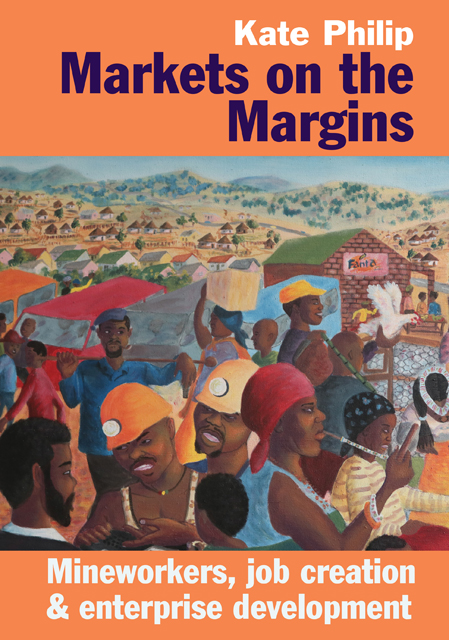Book contents
- Frontmatter
- Contents
- List of Illustrations
- Preface
- Acknowledgements
- Abbreviations
- 1 Introduction: Setting the scene
- 2 The 1987 Mineworkers Strike
- 3 Conflict in the Transkei
- 4 Power Struggles in Lesotho
- 5 Co-ops Capture the Imagination
- 6 The NUM Co-op Programme
- 7 Challenges of Democratic Ownership & Control
- 8 Rethinking Degeneration in Co-op Theory
- 9 The Mineworkers Development Agency’s Development Centre Strategy
- 10 Small Enterprise: In the shadow of the core economy
- 11 A New Enterprise Development Paradigm
- 12 Market Development – or a New ‘Anti-Politics Machine’?
- 13 Breaking into Higher-value Markets in the Craft Sector
- 14 Marula: Product innovation & value chains
- 15 Implications for Enterprise Development Strategy
- 16 If Markets are Social Constructs, how Might we Construct them Differently?
- Select Bibliography
- Index
10 - Small Enterprise: In the shadow of the core economy
Published online by Cambridge University Press: 20 January 2023
- Frontmatter
- Contents
- List of Illustrations
- Preface
- Acknowledgements
- Abbreviations
- 1 Introduction: Setting the scene
- 2 The 1987 Mineworkers Strike
- 3 Conflict in the Transkei
- 4 Power Struggles in Lesotho
- 5 Co-ops Capture the Imagination
- 6 The NUM Co-op Programme
- 7 Challenges of Democratic Ownership & Control
- 8 Rethinking Degeneration in Co-op Theory
- 9 The Mineworkers Development Agency’s Development Centre Strategy
- 10 Small Enterprise: In the shadow of the core economy
- 11 A New Enterprise Development Paradigm
- 12 Market Development – or a New ‘Anti-Politics Machine’?
- 13 Breaking into Higher-value Markets in the Craft Sector
- 14 Marula: Product innovation & value chains
- 15 Implications for Enterprise Development Strategy
- 16 If Markets are Social Constructs, how Might we Construct them Differently?
- Select Bibliography
- Index
Summary
From the late 1990s, the policy discourse started to place increasing store on the scope for small enterprise to provide a solution to South Africa’s stubbornly high levels of unemployment. In particular, there was an assumption that – enabled by access to micro-loans at commercial interest rates and a bit of grit and determination – the poor would be able to self-employ their way out of poverty. The attraction of this solution was clear: poverty could be solved through the market-driven efforts of the poor themselves, while leaving the core economy and its patterns of accumulation untouched, with no wider change in economic structures or patterns of distribution required. The banks could even profit from it.
Yet against the backdrop of this growing hubris, the Mineworkers Development Agency (MDA) was confronted in practice with the limits of such an approach. Despite the alacrity with which poor and unemployed people were using the services of the MDA centres and initiating enterprise activity, returns were, for the most part, low. Time and again, the explanation given to MDA by entrepreneurs was that there was ‘no market’ for their products. Closer inspection, however, found that all too often, there was no lack of such markets: they were just already taken.
The strategy of supporting local production for local consumption embraced by MDA’s centres overlooked a crucial reality: that, distant as the commanding heights of the South African economy might appear from the vantage of its most remote and poorly developed rural margins, ‘the local’ was inextricably tied to the national and even global economy. In fact, we had made the same mistake that President Thabo Mbeki was to make some years later, during an address to the National Council of Provinces, in his description of South Africa as having ‘two economies’:
The second economy (or the marginalised economy) is characterised by underdevelopment, contributes little to GDP, contains a large percentage of our population, incorporates the poorest of our rural and urban poor, is structurally disconnected from both the first and the global economy, and is incapable of self-generated growth and development. (Mbeki 2003)
Certainly, apartheid’s migrant-labour policies and the bantustan policies that followed left stark legacies of economic marginalisation, reflected in the extreme spatial inequality that still today provides a proxy map for where the bantustans used to be, in relation to any poverty indicator one cares to choose.
- Type
- Chapter
- Information
- Markets on the MarginsMineworkers, Job Creation and Enterprise Development, pp. 111 - 116Publisher: Boydell & BrewerPrint publication year: 2018



